#466 A tribute to Richard Wagamese
INTERVIEW: Shelagh Rogers by Starlight: CBC’s Host of The Next Chapter Shines a Light on Indigenous Authors
by Margot Fedoruk
*
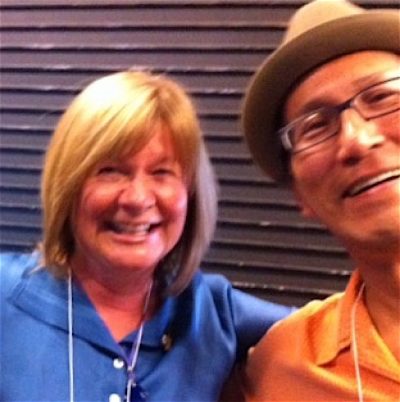
Shelagh Rogers walks in with an air of authority and greets everyone warmly as she stands in line at the local coffee shop on Gabriola Island. Rogers wears the iconic pointy blue glasses that make her look like a pleasant librarian instead of one of Canada’s best-known radio broadcasters.
We talk for almost an hour over cooling coffee, “Oh, I’m used to cold coffee,” Rogers jokes.
Rogers produces and hosts the long-running CBC radio show The Next Chapter, where she has had the good fortune to discuss books with a vast array of Canadian authors. “We were the number two show on CBC when Rick Mercer was on the air,” she says with her familiar voice that is smooth like polished stone.
 Rogers is currently the chancellor of the University of Victoria (UVic), a role that has her presenting many events on and around campus since 2015. On December 4, 2018, she hosted the tribute to Richard Wagamese’s final book at UVic’s First Peoples’ House.
Rogers is currently the chancellor of the University of Victoria (UVic), a role that has her presenting many events on and around campus since 2015. On December 4, 2018, she hosted the tribute to Richard Wagamese’s final book at UVic’s First Peoples’ House.
Richard Wagamese died in March 2017, aged 61, before finishing his last novel, Starlight (Penguin Random House, 2019, reviewed here by Eldon Yellowhorn — ed).
Rogers received the manuscript for Starlight in 2014 but did not read it until after his death in 2017.
“I’ve known Richard since 1994 and we were close friends,” she says.
When Rogers first interviewed Wagamese, she mispronounced his name, she rhymed Wagamese with wheezy; something she calls the “Italian treatment.” That’s when they first became friends.
Rogers was originally asked by his publisher to celebrate Wagamese’s life and legacy and to pay tribute to his last novel to several literary events. “I wasn’t promoting the book per se, but it may have happened along the way,” says Rogers.
 Susan Juby, Creative Writing and Journalism professor at Vancouver Island University (VIU) and author of the popular YA novel Alice I Think, was interviewed by Rogers when her first book got published. “Authors are very grateful for what she does for them,” says Juby.
Susan Juby, Creative Writing and Journalism professor at Vancouver Island University (VIU) and author of the popular YA novel Alice I Think, was interviewed by Rogers when her first book got published. “Authors are very grateful for what she does for them,” says Juby.
Rogers began her career for the CBC radio in 1980 when she was twenty-four. “It was part of an initiative to hire more women in the industry,” says Rogers.
Recently, Rogers had the honour of co-hosting a special radio broadcast of the 2018 Scotiabank Giller prize gala event with CBC’s Jael Richardson.
Besides being a champion of Canadian books, Rogers has won many awards including the Transforming Lives Award in 2008. She has also won the Margaret Trudeau award for mental health advocacy and is an activist for ending adult literacy.

It was not until 2011 that Rogers was asked to work as an honorary witness for the Truth and Reconciliation Commission (TRC) of Canada, a position she had to really think about before accepting because the position is for life, Rogers explains.
Rogers has also worked on a series of books about the subject to illuminate Indigenous voices. She believes that the TRC Report: The Survivors Speak (2015) is essential reading for every Canadian.
It is a cold night on December 4, 2018, when Rogers hosts the tribute to Richard Wagamese surrounded by the wood-lined walls of the auditorium in the First People’s House at UVic, and there is a long line-up to buy Wagamese’s books.
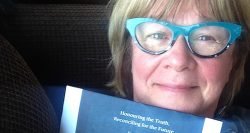
Attendees can also purchase other local author’s books such as Darrel McLeod’s award-winning book, Mamaskatch: A Cree Coming of Age (Douglas & McIntyre, 2018) (reviewed here by David Milward and here by Heather MacLeod — ed) and Monique Gray Smith’s book Tilly: A Story of Hope and Resilience (Sono Nis Press, 2013). Both Smith and McLeod have been interviewed by Rogers on The Next Chapter.
The panelists who are invited to talk about Wagamese’s book include David Leach, chairman of the UVic writing department, Lorna Crozier, award-winning author and professor emerita, and local Indigenous authors Troy Sebastian, Monique Gray Smith, and Darrel McLeod.
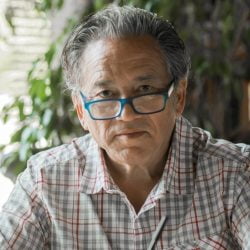
Rogers begins the tribute by saying, “Wagamese did not take his own life. What killed him was government policy and colonialism.”
McLeod says that although he never met Wagamese he feels that his spirit is powerful and that he broke ground for Indigenous authors.
Later in the evening, Sebastian raises the question whether it was right to publish Wagamese’s unfinished novel after his death? Does it matter that it is not finished? Isn’t having the consent of the Indigenous voices important?
Rogers diverts these questions to Wagamese’s literary agent, John Pearce, who is sitting in the audience. Pearce insists that Wagamese would not have given him a copy of the book if he didn’t want it to be published. Pearce claims that there were no major structural changes to the novel, only minor editing. The publisher decided to include two other pieces from different works at the end of Richard’s unfinished novel. One was an essay about searching for his father and the other was from a novella.
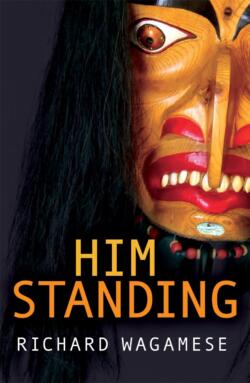
Crozier felt that Starlight did have a sense of incompleteness and that even so it “provides readers the opportunity to see Richard’s skill in other genres. The press gave the readers alternate endings to the book, or at least, alternate ways for us to imagine the ending.”
In her closing tribute, Rogers reads an excerpt from Wagamese’s memoir Embers: One Ojibway’s Meditations (Douglas & McIntyre, 2016):
These days I choose to face life head on — and I have become a comet. I arc across the sky of my life and the harder times are the friction that lets the worn and tired bits drop away. It’s a good way to travel; eventually, I will wear away all resistance until all there is left of me is light.
Rogers thinks that Starlight is Wagamese’s masterpiece. “It is breathtakingly beautiful,” she says. “I have great fortune in my occupation. The books being written by Canadians are phenomenal right now,” she says.
*
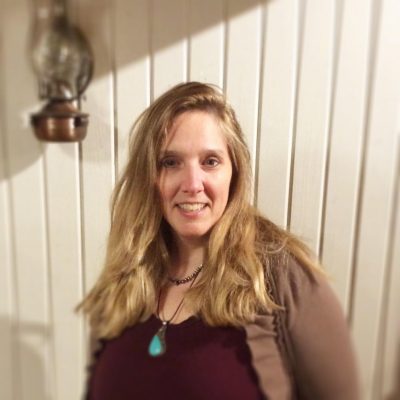
Margot Fedoruk lives and works on Gabriola Island. Her publishing credits include personal essays in the Globe and Mail and Island Parent Magazine. She has a degree in Environmental Studies and is currently pursuing a creative writing degree at Vancouver Island University. Contact her at redurchin@shaw.ca She blogs here and here.
*
The British Columbia Review
Publisher and Editor: Richard Mackie
Formerly The Ormsby Review, The British Columbia Review is an on-line book review and journal service for BC writers and readers. The Advisory Board consists of Jean Barman, Wade Davis, Robin Fisher, Barry Gough, Hugh Johnston, Kathy Mezei, Patricia Roy, Maria Tippett, and Graeme Wynn. Provincial Government Patron (since September 2018): Creative BC. Honorary Patron: Yosef Wosk. Scholarly Patron: SFU Graduate Liberal Studies.
“Only connect.” – E.M. Forster
*
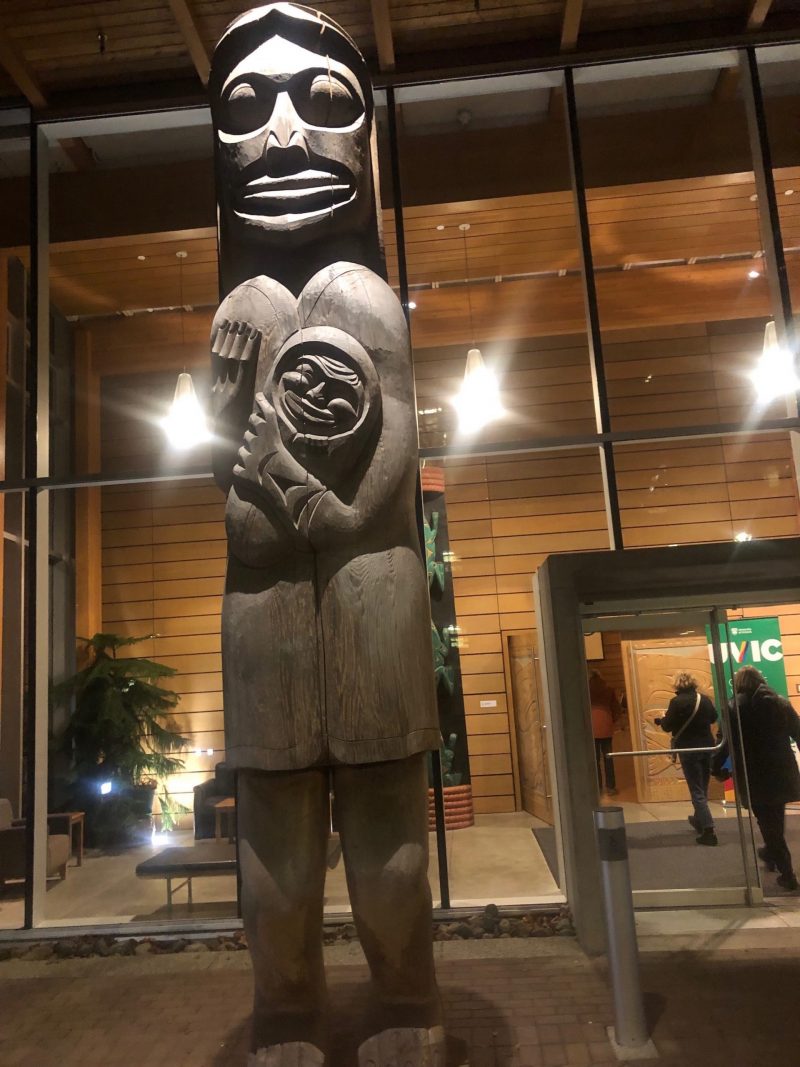
2 comments on “#466 A tribute to Richard Wagamese”
Comments are closed.